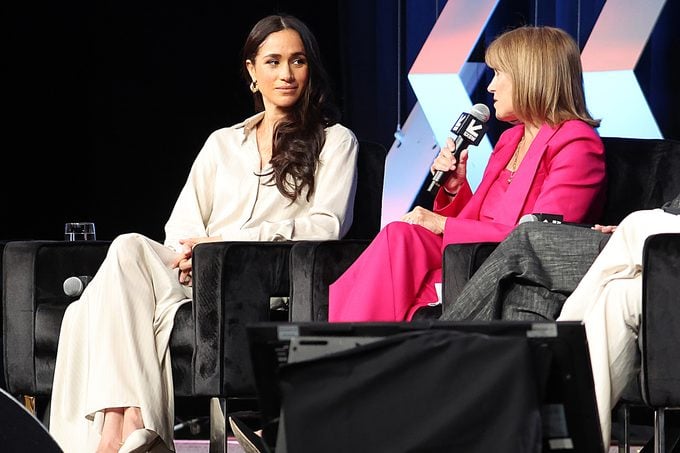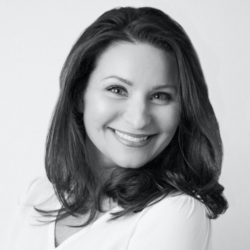If Katie Couric and This Body Part Are Still Synonymous? “I’m OK with It,” She Says
Updated: Mar. 19, 2024

The long-beloved figure discusses her ongoing commitment to raise awareness for routine screenings during Colon Cancer Awareness Month.
The general recommended age to undergo your first colonoscopy has been reduced to 45 in recent years, due in large part to rising colon cancer diagnosis rates among Americans under 50.
If you happen to be around age 45, you might recall the episode of TODAY in 2000 when longtime co-host Katie Couric took viewers through her first colonoscopy experience. For many Americans, Couric’s lighthearted journey helped to solidify an understanding for how important—and how universal—colonoscopies need to be.
So if the thought of getting a colonoscopy calls her to mind, Couric says she’ll accept that as part of her journalistic legacy. “You know,” she reflects, “my name is associated with a certain part of people’s anatomy. And honestly, I’m OK with that.”
The same weekend she appeared alongside Duchess of Sussex Meghan Markle and Brooke Shields on an International Women’s Day panel at South by Southwest, last week Couric joined hundreds of colon cancer patients, survivors, and caregivers at the Cologuard Classic, a PGA Tour Champions tournament in Tucson.

As data suggest approximately 60 million average-risk adults remain unscreened in the United States, Couric spoke with The Healthy @Reader’s Digest about how keeping this topic on America’s radar is one way she honors the memory of her late first husband, Jay Monahan, whose 1998 passing made colon cancer a personal matter for this media icon and her family.
Stay informed to stay well when you subscribe to the FREE The Healthy @Reader’s Digest newsletter
The Healthy @Reader’s Digest: For decades audiences have appreciated your good-natured approach to telling us what we need to know. What you’ve done around colorectal cancer prevention and awareness arguably stands out as one of your greatest contributions.
Katie Couric: You know, there’s a children’s book called Everybody Poops. I think we have to stop being so precious about that part of our body, because like every other part, it’s important to keep it healthy and make sure that nothing bad is happening there. The fact that I’ve been able to hopefully give people the information they need to save their lives is something I’m just exorbitantly proud of.
The Healthy: Rightfully so. Have you seen your public education efforts over the past 25 years make a difference?
Katie Couric: I have, I think. Colorectal cancer, which is not the easiest thing to say, has become much more a part of the public. I think people understand it better. They’re much more informed about the importance of screening and early detection.
But it’s not one-and-done. You’ve got to keep talking about it, because I think it’s so easy for people to put it on the back burner or to say, “Oh, I’m not really at risk for that because I don’t have a family history.” By the way, the vast majority of cases involve people with no family history. So it [may seem] inconvenient, or just not at the top of people’s to-do list, or they say, “I’ll put it off”—or excuse after excuse after excuse.
That’s why I think we really need a sustained public health effort by a lot of groups that are really focused on this. One of the nice things about the Cologuard Classic, it brings advocacy groups from all over the country who are addressing this number-two cancer killer of men and women combined in a whole myriad of ways: Whether they’re concentrating on getting men screened, or trying to understand why more and more people under the age of 50 are getting diagnosed, or it’s survivors trying to spread the word about early detection. So it’s a really exciting opportunity for us to put our heads together and and figure out how we can continue to educate people about awareness, and how we can continue to help support research for this disease.
The Healthy: What would you say to Americans who are interested in an at-home screening kit like the ones Cologuard makes?
Katie Couric: My major message is the best test is the one that gets done. There are some people who, for whatever reason—maybe insurance, maybe it’s childcare, maybe it’s squeamishness or cost, or they can’t take a day off work—Cologuard is a really great test that winnows down the population of people who need additional screening because it’s very sensitive. It’s just a sort of an early warning device for people who have some barrier to entry, and it’s covered by insurance. I think a lot of underserved people can have access Cologuard. It’s potentially life-saving.
The Healthy: For those of us who follow you, you just keep living your best life. It would almost be easy to forget that starting in late 2022, you were journeying through breast cancer. So many women and families know how stunning it can be to hear a cancer diagnosis. Was there any one thing that got you through that experience?
Katie Couric: All I kept thinking about, honestly, was how lucky I was. It was diagnosed early: stage 1A breast cancer.
I kept thinking how lucky I was to have access to some of the best doctors and medical care, and I kept thinking about people who didn’t. What do they do if they don’t have access, or don’t have the information about the importance of screening and early detection, or for whatever reason, are not trusting of the medical establishment? Some people of color are not, because there’s not enough diversity and [in the U.S. healthcare system] we don’t have it exactly an illustrious history for that.
It’s a strange thing to be diagnosed with cancer and really just feel grateful. But I was, and that’s what I kept thinking, and contrasting it to when Jay was diagnosed—gosh, 24, 25 years earlier. He was diagnosed with stage 4 colon cancer. There are a lot of symptoms for colorectal cancer, but unfortunately, when you experience them, it’s often too late.
We’re living in such exciting times when it comes to cancer research. And I’m really hopeful that there’ll be better screening for things like pancreatic cancer and ovarian cancer, and all kinds of cancers. I mean, [my breast cancer diagnosis] was such a stark reminder that if you find cancer early, you’re one of the lucky ones. And the only way to find cancer early is to get screened.
The Healthy: We who follow you on social know that soon you’ll celebrate the birth of your first grandchild. Congratulations.
Katie Couric: Thank you. My husband was like, “Oh Lord, we’re going to see a lot of baby pictures on Instagram.”
The Healthy: We talked to you before the National Senior Games last year, and you’re part of the changing face of vibrant aging—so we want to see your pictures of grandmotherhood! Many surviving spouses and families might relate to this: With Jay having been gone over these years, is there a bittersweetness to these moments in your family’s lives?
Katie Couric: Yes, for sure. You know, I think about Jay a lot and all he’s missed, but when we approach these really important life moments and milestones, I’m acutely aware of the fact that he is missing them. My daughter [Carrie] graduated not too long ago from Stanford and won this big writing award—she’s going to kill me. So don’t include that. I was so proud. And all I could think of is, Jay would have been so proud. [My elder daughter] Ellie got married a couple of years ago, there was no one to walk her down the aisle. John, my husband, could have done it; I could have done it, but Ellie decided she wanted to walk alone, which I think is such a fierce showing of strength and independence.
And now, of course, he would be having his first grandchild, and it is just so, so sad to see how much he was ripped off of these experiences. That’s why I feel so strongly that if I can do anything that will help other people, that’s what kind of keeps me going, honestly.
Get The Healthy @Reader’s Digest newsletter, and keep reading:
- Lance Bass Gets Real About the Health Problem That Affects Him Every Day
- What To Eat After a Colonoscopy: An Expert Doctor’s 5 Foods for Recovery, and 5 To Avoid
- More Than 35,000 Pounds of Meat Recalled by Major Brand in 11 States
- Colon Cancer and Poop: What to Watch For, According to a Colorectal Surgeon


















